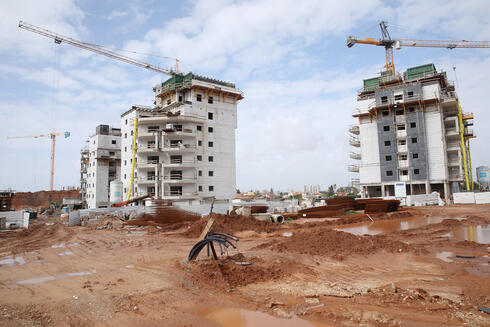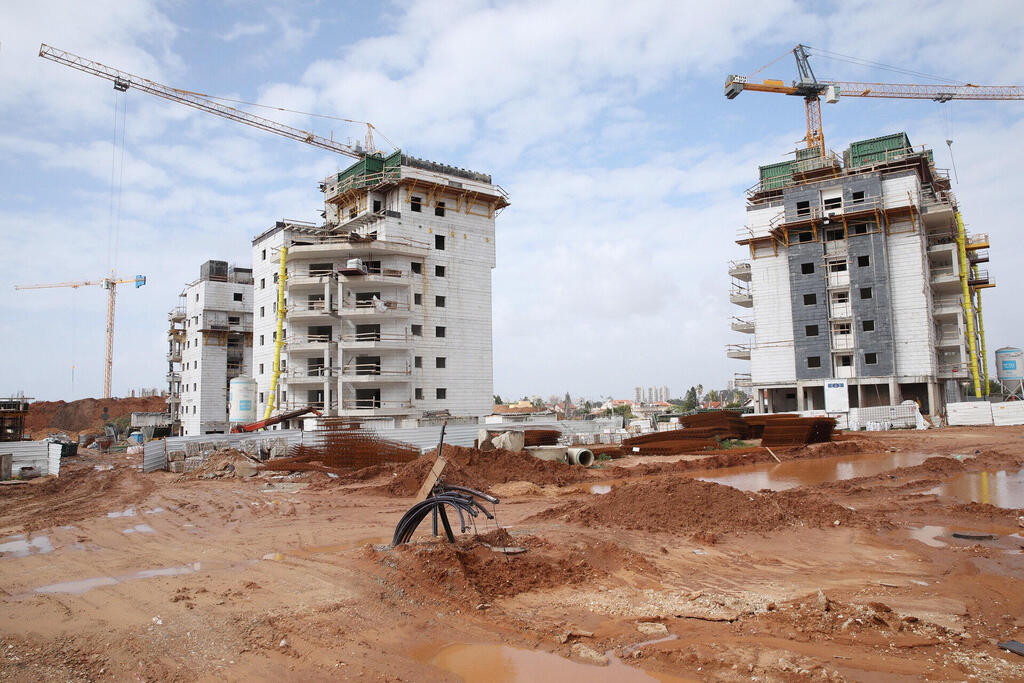
Israeli real estate prices drop for first time in years ahead of war
There was a 2.9% drop in real estate prices in the third quarter of 2023, according to the Alrov and Calcalist index data. However, since the beginning of the war, the entire industry has come to a standstill - and the sharp drop in construction starts may ultimately lead to an increase in prices
There was a positive shift in the situation for apartment buyers in the third quarter of 2023, according to figures released by the Alrov Institute for Real Estate Research at the Coller School of Management, Tel Aviv University, in collaboration with Calcalist. Although not a drastic change, this shift was significant, making the prospect of purchasing an apartment more accessible for some and indicating a departure from the trend of increasing unattainability over the years.
The Alrov Index assesses the ability to purchase an apartment based on monthly repayment and equity required for the purchase, considering three key variables. In the third quarter, these variables favored buyers. The index reported a 2.9% decrease in the price of a 4-room apartment across the 12 cities surveyed, dropping from NIS 2.73 million to NIS 2.65 million. Concurrently, household incomes saw a modest 0.5% increase, while the average mortgage interest rate dipped by 0.16% to approximately 5.2%.
The study was conducted by Prof. Danny Ben-Shahar, head of the Alrov Institute for Real Estate Research and a faculty member at the Coller Faculty of Management at Tel Aviv University, and Dr. Dana Nayer, a research associate at the institute. "This was the first quarter in which the average of the indices decreased, after nine consecutive quarters of increases," says Prof. Ben-Shahar. "This is happening because of three main factors: a moderate decrease in the average interest rate on mortgages, a quarterly decrease in apartment prices and a slight increase in income."
Ben-Shahar points out that according to the Alrov index, there have been no decreases in apartment prices in about three years. "There has been no decrease in the index since the third quarter of 2020, while in the third quarter of this year there was a considerable decrease, at a rate of about 2.9%," he noted.
Regarding the interest rate, Ben-Shahar says: "The moderate decrease that we see now in the interest rate on mortgages reflects the expectations that the high interest rate will not continue in the long term. The high interest rate comes to deal with inflation and there is a feeling that inflation is currently under control in the world and in Israel, if we put aside the war."
The increase in interest rates that began in April 2022 meant that the amount of the monthly repayment is one of the main considerations for the purchase of an apartment by couples, many of whom have stretched their financial capacity to the limit, therefore any change in the amount of the repayment has a great significance on their ability to purchase. The monthly repayment index examines the amount of payments on a typical 4-room apartment, with the financing rate being 70% of the apartment's value (and the remaining equity at the rate of 30% of the apartment's value). According to the data, in the third quarter of 2023 the repayment decreased by NIS 512 per month (from NIS 11,665 to NIS 11,153) and at a rate of about 4.4% compared to the previous quarter. In the corresponding quarter last year, the repayment was NIS 8,918.
In 10 of the 12 cities examined in the index, there was a decrease in the monthly repayment required in the third quarter of 2023 compared to the previous quarter: in Tel Aviv the decrease was the sharpest and stood at a rate of 7.0%, in Rishon Lezion 6.3%, in Jerusalem 5.5%, in Be'er Sheva 5.4%, in Rehovot 5.3 %, in Petah Tikva 5.1%, in Haifa 2.1%, in Hadera 1.8% and in Bat Yam and Ramat Gan 0.9%. An increase in the required monthly repayment in the third quarter of 2023 compared to the previous quarter was registered in Bnei Brak and Ashdod, at a rate of 8.3% and 1% respectively. In nominal terms, the monthly repayment required at the municipal level in the current quarter is NIS 4,982 in Beer Sheva, NIS 6,173 in Haifa, NIS 9,039 in Ashdod, NIS 9,597 in Hadera, NIS 9,606 in Petah Tikva, NIS 9,661 in Bat Yam, NIS 10,029 in Rehovot, NIS 10,035 in Rishon Lezion, NIS 11,391 in Bnei Brak, NIS 11,484 in Jerusalem, NIS 12,447 in Ramat Gan and NIS 18,159 in Tel Aviv.
Compared to the corresponding quarter last year, the average monthly repayment in the third quarter of 2023 increased from NIS 8,918 (in the third quarter of 2022) to NIS 11,153 (in the third quarter of 2023) - an annual increase of about 25%. At the municipal level, increases compared to the corresponding quarter last year were observed in all the cities examined. The sharpest increase in the last year was recorded in Hadera at a rate of 35.9%, and the lowest in Bat Yam - 16.0%.
The situation of the apartment buyers is also examined in the equity index, which tests the ability to purchase a typical 4-room apartment, so that the current monthly payment on the mortgage does not exceed 30% of the household's average net income.
The data show that the upward trend in the index that began in the second quarter of 2021 was halted in the third quarter of 2023. Compared to the quarter that preceded it, in the third quarter of 2023 the equity index decreased on average nationally by approximately NIS 101,000 (from NIS 1.692 million to NIS 1.591 million) which reflects A decrease of about 6.0%. However, in an annual calculation, the equity index increased by approximately NIS 232,000 (from approximately NIS 1.359 million to NIS 1.591 million), reflecting an increase of approximately 17.1%.
In the division by cities it can be seen that in 10 of the 12 cities examined there was a decrease in equity. In Beer Sheva a decrease of 36.3%, about 70,000 nominal shekels, in Rishon Lezion a decrease of 142,000 shekels, in Petah Tikva 107,000 shekels, in Tel Aviv 275,000 shekels, in Jerusalem 138,000 shekels and in Haifa 31,000 shekels.
As mentioned, the index reflects the situation of home buyers on the eve of the war, but the dramatic changes that took place in Israeli society due to the events of October 7, and the stagnation that has characterized the real estate industry ever since, raise fears of deeper damage in the future. The first evidence that hints at the future can already be seen in the reports of the public real estate companies. Some of them testify that since the outbreak of the war, for nearly two months, they sold only a few apartments. The macro data, and in particular the volume of transactions in apartments before the crisis, also indicate that the starting point with which we reached the war was problematic, and the stagnation in the industry began even earlier. The number of transactions in the third quarter was 7.3% lower compared to the previous quarter, and 43.5% lower than the corresponding quarter last year.
According to Ben-Shahar, the fear for the stability of the industry does not stem only from the lack of transactions but from a wider issure. "I fear we will see a deterioration in the fourth quarter of 2023," he says. "The paralysis currently occurring in the market is not only at the level of transactions. The big concern is a sharp drop in construction starts. We see a great lack of workers in the construction industry, and this may introduce pressures of excess demand in the future and may lead to a renewed outbreak of prices. To begin with, we have reached this period with suppressed demands due to the increase in the interest rate, and the war can lead to a decrease in supply in the future."














